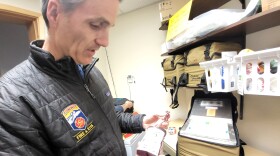-
Yellow snow isn't the only concern when snowmelt is a main drinking water source.
-
Congress let enhanced premium subsidies for Affordable Care Act marketplace plans expire at the end of the year. The subsidy had attracted a steady increase of signups in Wyoming for years.
-
The majority of justices upheld abortion access in Wyoming. How did we get here, and what’s next?
-
According to Brain Chemistry Labs, the in-the-works test can identify an ALS patient with 97% accuracy. The next step is to get it validated by a clinically certified lab.
-
The state’s highest court ruled that two near-total state abortion bans violate the constitution.
-
Wyoming’s first-year award will help sustain critical care access hospitals and labor and delivery services. Workforce development, chronic disease prevention, behavioral health, and innovative approaches to delivering care and handling payments will also be supported.
-
Wyoming is one of 13 state yet to opt into the program known as Summer Electronic Benefit Transfer. The program provides $120 during the summer months for each school-age child who qualifies for free or reduced-price meals during the school year.
-
"Rule number one is rule number one for a reason: You got to take care of yourself," said Banner Wyoming Medical Center's Dr. Marshall Henderson.
-
The vaccinated adult had “extensive exposure" to the virus while abroad and developed a mild case that didn’t require hospitalization, per the health department.
-
That’s following the back-and-forth about the funding of SNAP benefits during the government shutdown in November.
-
The Honoring Our Fallen Heroes Act was introduced by Democratic Minnesota Sen. Amy Klobuchar in January, but has received substantial bipartisan support.
-
Spending time in nature can help military veterans cope with stress, depression and post-traumatic stress disorder. But a new report finds many veterans across the U.S. don’t live close enough to parks or green spaces to easily benefit from that connection.

















